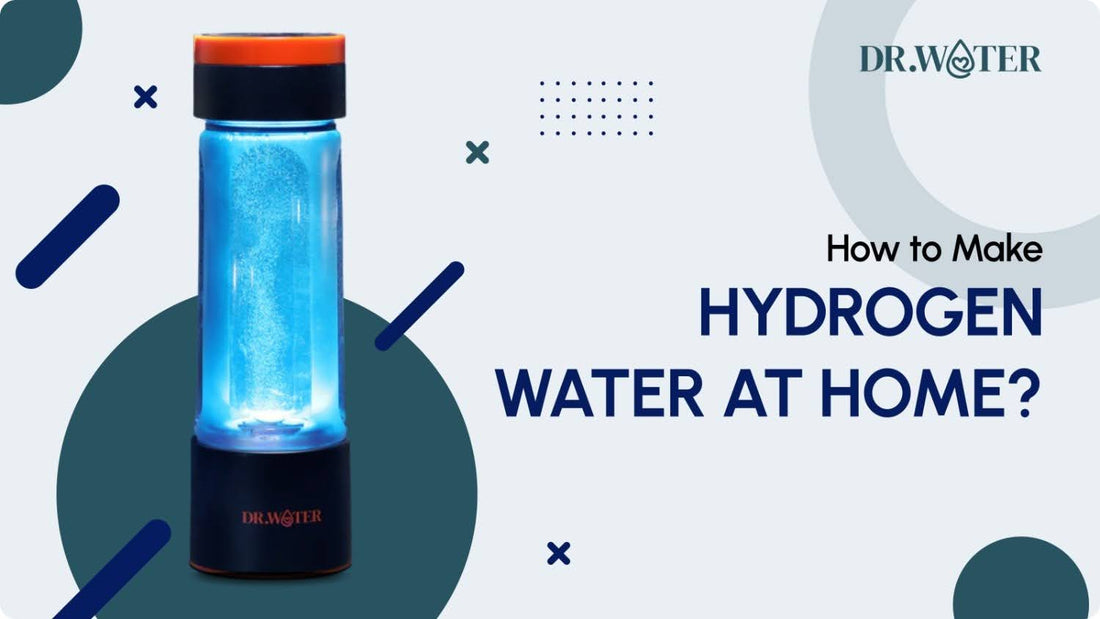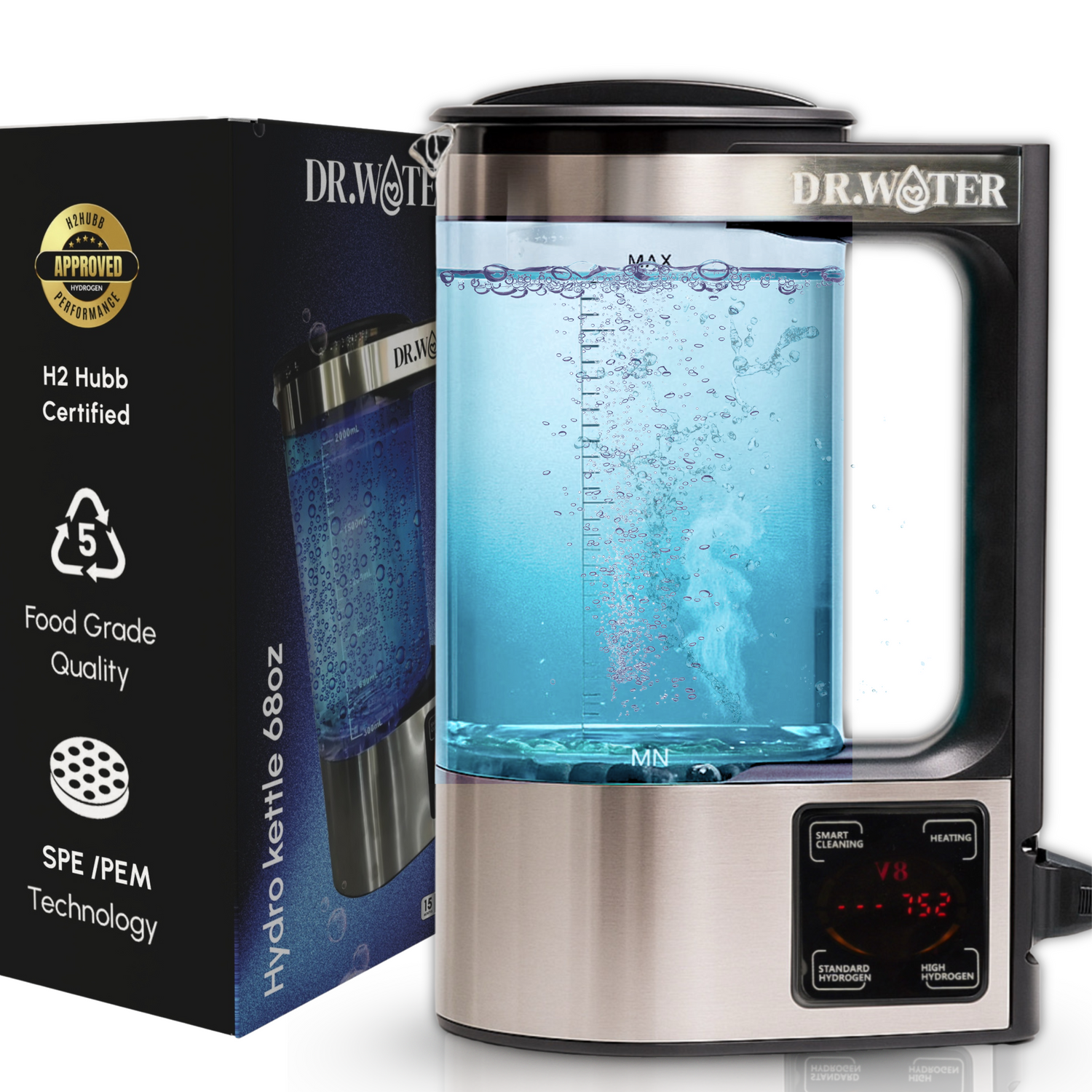
How to Make Hydrogen Water at Home
Share
Curious about how to upgrade your hydration routine without leaving your kitchen? Hydrogen water is making waves in the wellness world and for good reason. Unlike regular water, it’s infused with Molecular Hydrogen (H₂), a powerful antioxidant known for supporting energy, recovery, and overall cellular health.
We understand that starting a new health habit like making hydrogen water at home can feel a bit confusing or overwhelming at first, especially with all the options and information out there.
While it may sound high-tech, making hydrogen water at home is surprisingly simple. With the right tools and a little know-how, you can enjoy the benefits of hydrogen-rich hydration daily without depending on expensive bottled versions or gimmicky trends.
This guide walks you through safe, science-backed methods to create hydrogen water at home, explores the pros and cons of each approach, and helps you choose the best method for your lifestyle.
Let’s begin by understanding exactly what hydrogen water is and why it’s gaining attention.
TL;DR:
- Hydrogen water is regular water infused with molecular hydrogen (H₂) that may help reduce oxidative stress, boost energy, and support cellular health.
- Making it at home is cost-effective compared to buying bottled hydrogen water, which often loses potency during storage and transportation.
- You can create hydrogen water using tablets, electric generators, or DIY magnesium + acid methods, each offering different pros and cons.
- Home preparation allows better control over water quality, letting you use filtered or distilled water and avoid contaminants like chlorine or heavy metals.
- Key tips for optimal results include using clean water, drinking it fresh, avoiding agitation, and choosing NSF-certified devices to ensure safety and reliability.
What is Hydrogen Water?

Hydrogen water is simply water infused with molecular hydrogen gas (H₂), which is the smallest and most bioavailable molecule in the universe. This added hydrogen doesn’t change the taste or appearance of the water, but it may deliver powerful health benefits at a cellular level.
Perfect for athletes and fitness enthusiasts aiming to enhance recovery and energy, drinking hydrogen water results in tiny H₂ molecules penetrating deep into your cells. This potentially reduces oxidative stress and inflammation, two factors linked to aging and chronic disease. Research suggests that molecular hydrogen acts as a selective antioxidant, neutralizing harmful free radicals while supporting the body’s natural healing processes.
This growing body of research has led athletes, wellness seekers, and medical professionals to explore hydrogen water as a natural way to support energy, recovery, and longevity.
Now that you know what hydrogen water is, let’s explore why it might be worth making at home rather than buying it in bottles.
Why Make Hydrogen Water at Home?

If you’re already buying bottled hydrogen water, you know it can be expensive and not always practical. Fortunately, making hydrogen water at home offers multiple long-term advantages that go well beyond saving money, especially for co-conscious consumers valuing sustainability and carbon-neutral products.
Here’s why more health-conscious and eco-minded individuals are making the switch:
1. More Cost-Effective in the Long Run
Pre-bottled hydrogen water can cost between $2 to $5 per bottle, which adds up quickly if you drink it daily. That’s over $1,000 a year for a single bottle per day.
In contrast, home solutions like hydrogen tablets or electric generators require an upfront investment but are much more affordable over time. For example, a high-quality hydrogen water bottle or system can provide hundreds of uses from a single charge or cartridge, saving you money while giving you full control over your hydration.
2. Better Control Over Water Quality
Health-conscious individuals focused on improving their hydration and wellness only demand the best quality. When preparing hydrogen water, always use filtered or distilled water to control quality and avoid contaminants like chlorine, heavy metals, or microplastics, maximizing both safety and effectiveness.
This also allows you to pair hydrogen infusion with clean, mineral-balanced water, optimizing both safety and taste. For people with specific dietary or health needs, this level of customization is a major advantage.
3. Eco-Friendly & Sustainable Choice
Each hydrogen water bottle you skip helps reduce single-use plastic waste. Switching to a reusable, at-home hydrogen system significantly lowers your environmental footprint.
Many bottled hydrogen products come in aluminum or Polyethylene Terephthalate (PET) containers that contribute to landfill waste and carbon emissions during transport. By producing your own, you eliminate unnecessary packaging and cut back on supply chain emissions.
4. Convenient & Consistent Hydration
With a home generator or tablets on hand, you can prepare hydrogen water anytime, morning, post-workout, or before bed, without needing to stock up or wait for deliveries.
This ensures consistent access to high-quality hydration, allowing you to build a reliable wellness habit. And unlike bottled options, you never have to worry about expiration dates, availability, or stale inventory.
5. Customizable Hydrogen Concentration
When making hydrogen water at home, you can often adjust the hydrogen concentration based on your needs. Advanced devices and systems allow for settings that vary infusion time or Parts Per Million (PPM) output, ideal for tailoring hydration to specific goals like recovery, energy, or cellular support.
Some users even test their water using portable hydrogen meters to ensure optimal levels, something you can’t do with off-the-shelf bottled products.
Now that we’ve covered the “why,” let’s dive into how to make hydrogen water at home using safe and effective methods.
Also Read: How Much and When to Drink Hydrogen Water: Consumption Guideline
3 Popular Methods to Make Hydrogen Water at Home
There are several ways to infuse your water with molecular hydrogen, from quick solutions to more advanced setups. Here’s a breakdown of the most common methods you can try at home:
1. Using Hydrogen Tablets
Hydrogen tablets typically contain magnesium, which reacts with water to release molecular hydrogen gas. When dropped into water, they create a fizzy reaction that infuses the water with H₂ within minutes.
Steps to prepare:
- Fill a glass with clean, filtered water.
- Drop in one hydrogen tablet.
- Wait 5–10 minutes for full dissolution (don’t stir).
- Drink immediately to capture maximum hydrogen content.
Pros and Cons of Using Hydrogen Tablets

While tablets offer convenience, you may want something more precise and reusable. That’s where hydrogen generators come in.
2. Using a Hydrogen Water Bottle or Generator
Electric hydrogen water generators use electrolysis, a process where electric current passes through water, spitting it into hydrogen and oxygen gasses; platinum or titanium electrodes are used because they resist corrosion and efficiently conduct electricity, enriching the water with dissolved hydrogen safely and efficiently.
Steps to prepare:
- Fill the bottle or tank with filtered or distilled water.
- Press the start button.
- Wait 3–10 minutes for the infusion process to complete.
- Drink fresh or pour into a sealed container.
Pros and Cons of Using a Hydrogen Water Bottle or Generator

High-quality machines can consistently deliver high hydrogen concentration (upto 6 ppm) and are often National Sanitation Foundation (NSF)-certified for safety and reliability.
If you’re the DIY type, there’s also a chemistry-based method to explore, though it comes with caveats.
3. DIY with Magnesium + Malic Acid (Advanced Users)
This method involves combining pure magnesium metal with malic acid (or another weak acid) to create a chemical reaction that releases hydrogen gas into water.
Caution: This approach can be unpredictable and potentially unsafe without proper equipment and knowledge. The reaction must be carefully controlled, and materials must be food-grade and measured precisely.
Why it’s not ideal for most users:
- Inconsistent hydrogen concentration
- Risk of contamination if ingredients are impure
- Lacks certification and control over byproducts
Best for: DIY enthusiasts with a background in chemistry or scientific research not recommended for everyday users.
Pros and Cons of the DIY Method

Whichever method you choose, a few smart habits can help you maximize the benefits of your hydrogen water.
5 Tips to Get Best Results When Making Hydrogen Water at Home

To get the most out of your hydrogen water, whether you're using tablets or an advanced generator, keep these simple tips in mind:
1. Start with Clean, Filtered Water
Always use filtered or distilled water as your base to control quality and avoid contaminants like chlorine, heavy metals, or microplastics, maximizing both safety and effectiveness when preparing hydrogen water.
2. Drink It Fresh
Hydrogen is a light, volatile gas that escapes easily. Consume your hydrogen water immediately after preparation to take full advantage of its antioxidant potential. The fresher it is, the more hydrogen you'll benefit from.
3. Use Airtight Containers
If you need to store hydrogen water, pour it into a sealed, airtight container made of Bisphenol A (BPA)-free material. This slows down hydrogen loss and preserves its concentration for longer, though it’s still best to drink it within an hour or two.
4. Avoid Shaking or Stirring During Infusion
Let tablets dissolve or the machine complete its cycle without disturbing the water. Shaking or stirring prematurely can cause hydrogen gas to escape before it fully dissolves, reducing its health benefits.
5. Choose Certified Devices
If you're using a hydrogen water generator, always check for NSF, or similar safety certifications. These ensure the device has been tested for performance, material safety, and durability.
With these tips in mind, you might be wondering, how effective is homemade hydrogen water compared to commercial options?
Also Read: Hydrogen Water and Alkaline Water: Health Benefits and Differences
Is Homemade Hydrogen Water Effective?
Yes, when made correctly, homemade hydrogen water can be highly effective. The key lies in maintaining adequate hydrogen concentration and using reliable methods or devices.
Understanding Hydrogen Concentration (ppm)
The effectiveness of hydrogen water is measured by parts per million (PPM) of dissolved hydrogen gas. Clinical studies typically reference benefits in water with concentrations ranging from 0.5 to 1.6 ppm or higher.
For example, a 2012 study in Medical Gas Research found that hydrogen water at ~1.2 ppm helped reduce muscle fatigue in athletes.
How Different Methods Compare?

Pro Tip: Some home users invest in hydrogen concentration test kits to verify levels. While optional, this can help enthusiasts optimize their hydration routine and confirm device performance.
Dr. Water: The Smarter Way to Sip Hydrogen Water

Here’s the science: hydrogen gas starts escaping within minutes of exposure to air or light. That means by the time pre-bottled hydrogen water reaches your hand, its benefits could already be fading.
Dr. Water’s Hydrogen Systems are designed to solve exactly that. Using advanced, NSF-certified electrolysis technology, they generate fresh hydrogen water on demand, right when you need it. Whether you’re at home, in the gym, or on the go, you get maximum potency with every sip.
No cans. No guesswork. Just pure, science-backed hydration made for your lifestyle.
Ready to upgrade your water? With Dr. Water, fresh isn’t a luxury. It’s the standard.
Conclusion
Making hydrogen water at home is not only possible. It’s practical. Whether you choose effervescent tablets, a certified hydrogen water generator, or explore more advanced DIY methods, each approach has its own pros and cons. The right choice depends on your lifestyle, budget, and commitment to long-term wellness.
What they all have in common is the potential to support better hydration, improved energy levels, and cellular health, especially when backed by science and done correctly.
Ready to Make the Switch?
Want a hassle-free, science-backed way to make hydrogen water at home?
Explore Dr. Water’s advanced hydrogen systems, crafted for daily wellness and built with sustainability in mind. With NSF certifications, carbon-neutral design, and trusted by 10,000+ users, it’s hydration you can feel good about inside and out.
Frequently Asked Questions
1. What is the best way to make hydrogen water at home?
The most reliable method is using a certified hydrogen water generator or bottle that uses electrolysis. These devices offer consistent hydrogen levels and are safe for daily use.
2. How long does hydrogen stay in the water after it's made?
Hydrogen gas is highly volatile and begins to escape within minutes of exposure to air. To maximize benefits, drink your hydrogen water immediately after preparation or store it in a sealed, airtight container.
3. Can I use regular tap water in a hydrogen water bottle?
It’s best to use filtered or distilled water. Tap water may contain chlorine, heavy metals, or other impurities that can interfere with electrolysis and compromise safety and effectiveness.
4. How much hydrogen is ideal in drinking water?
Most health benefits are seen at 0.5 to 1.6 parts per million (ppm) of dissolved hydrogen. High-quality devices and some tablets can consistently reach this range.
5. Are hydrogen tablets safe to use every day?
Yes, if you're using NSF-certified tablets from a reputable brand. Always follow the manufacturer’s dosage instructions and avoid tablets that require special pH or temperature conditions.
6. Can I make hydrogen water using magnesium sticks or DIY setups?
While possible, DIY methods can be unsafe and unreliable. Magnesium sticks and acid-based reactions may produce inconsistent hydrogen levels and introduce contaminants.

